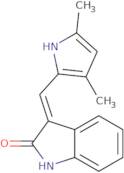Semaxanib (SU5416)
CAS: 194413-58-6
Ref. 3D-UHA41358
| 1mg | Discontinued | ||
| 5mg | Discontinued | ||
| 10mg | Discontinued | ||
| 25mg | Discontinued | ||
| 50mg | Discontinued | ||
| 500mg | Discontinued |
Product Information
- (3Z)-3-[(3,5-Dimethyl-1H-pyrrol-2-yl)methylene]-1,3-dihydro-2H-indol-2-one
- (3Z)-3-[(3,5-dimethyl-1H-pyrrol-2-yl)methylidene]-1,3-dihydro-2H-indol-2-one
- (3Z)-3-[(3,5-dimethyl-1H-pyrrol-2-yl)methylidene]-1H-indol-2-one
- (Z)-3-(3,5-Dimethylpyrrol-2-ylmethylene)indolin-2-one
- (Z)-Su 5416
- 2H-Indol-2-one, 3-[(3,5-dimethyl-1H-pyrrol-2-yl)methylene]-1,3-dihydro-, (3Z)-
- 2H-Indol-2-one, 3-[(3,5-dimethyl-1H-pyrrol-2-yl)methylene]-1,3-dihydro-, (Z)-
- 3-((2,4-Dimethylpyrrol-5-YL)METHYLIDENYL)-2-indolonone
- 3-[1-(3,5-Dimethyl-1H-pyrrol-2-yl)meth-(Z)-ylidene]-2-oxo-2,3-dihydroindole
- Nsc-696819
- See more synonyms
- Semaxanib
- Semoxind
- Su-5416
- Sugen
- Tsu-16
Semaxanib is a small molecule inhibitor of cell signaling pathways that has been shown to inhibit tumor growth in mice with solid tumors. It blocks the activation of the nuclear factor kappa-B (NF-κB) pathway by inhibiting the dephosphorylation and degradation of IκBα, which results in enhanced expression of inflammatory cytokines. Semaxanib also inhibits angiogenesis by blocking the activity of endothelial cell proliferation and migration, as well as tumor cell invasion. The compound also reduces oxidative stress by inhibiting reactive oxygen species production, which contributes to its antitumor effects.





